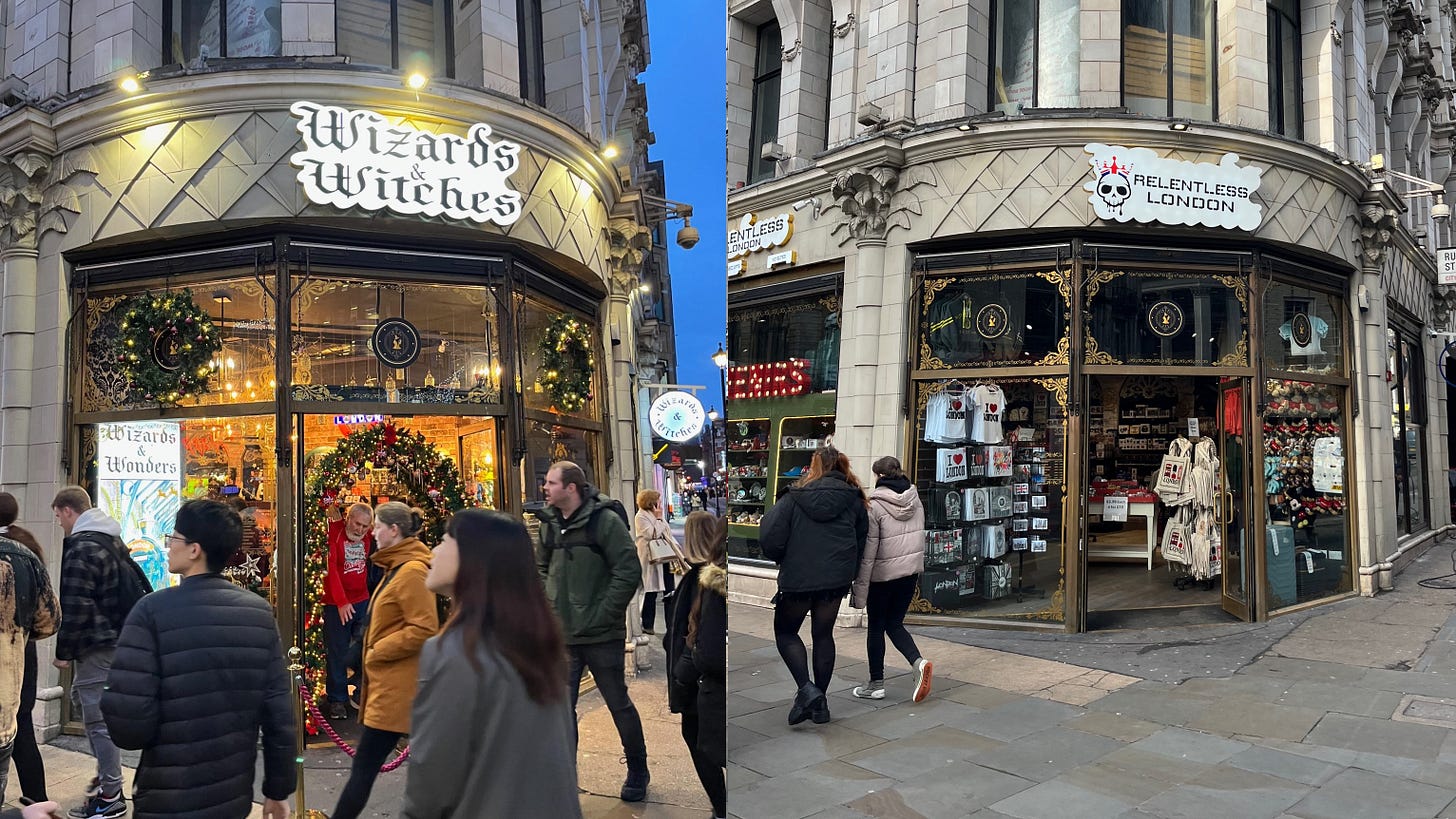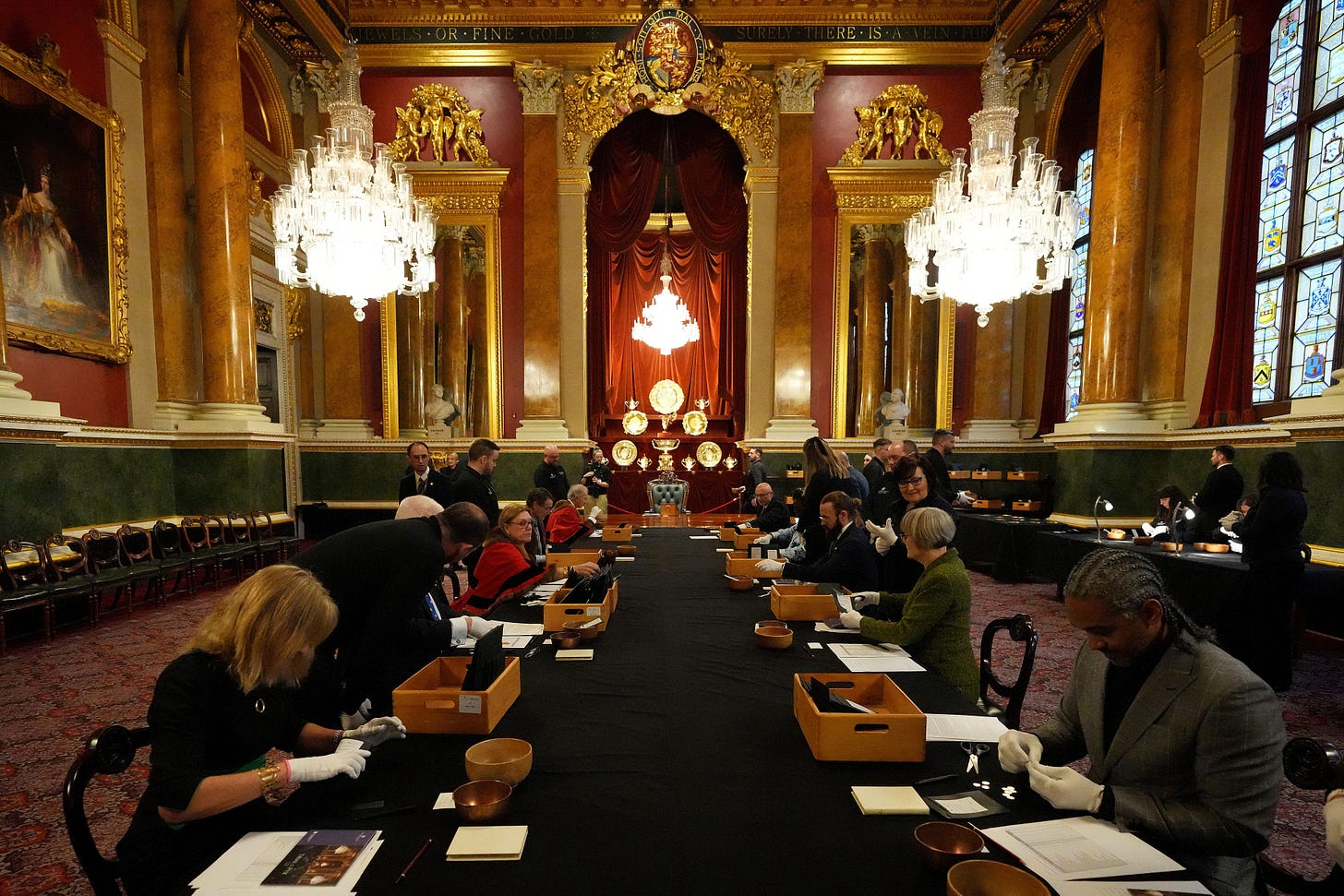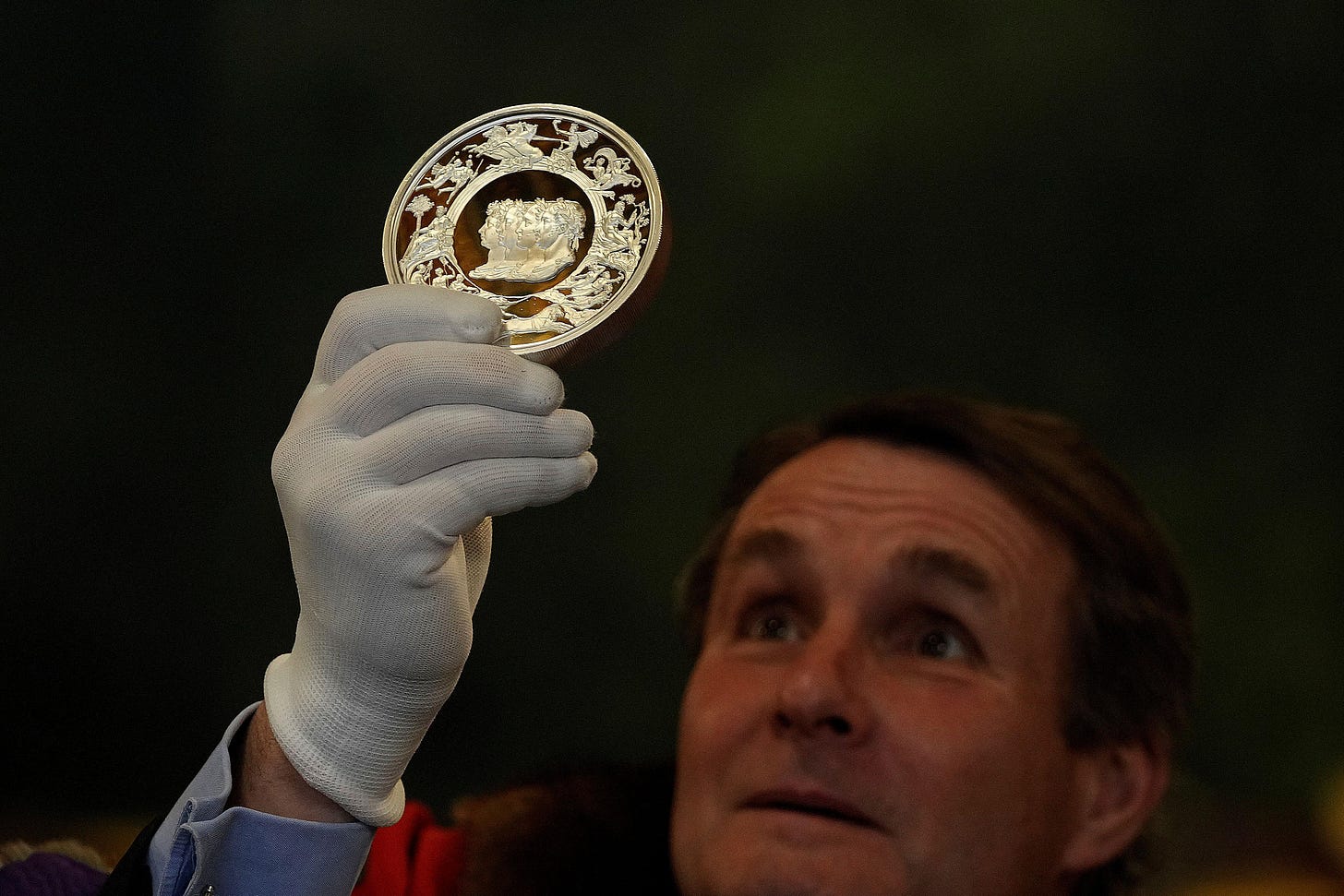Pyx or it didn't happen
Plus: The sudden closure of a Harry Potter shop, more on West End landlord Asif Aziz, and the prosecution of a Westminster Bridge hotdog salesman.
London Centric’s inbox has been a gory affair following the publication of Sunday’s investigation into the maintenance of Lime’s e-bikes. More and more readers have been getting in touch to share photos and videos of unfortunate incidents which they blame on the condition and design of the vehicles.
I’ll continue to look into that story, along with some major investigations about modern London over the coming weeks. But today I wanted to bring you a tale about a very different side of life in the capital, which is rooted in ancient traditions.
This involved a trip to the Trial of the Pyx. Few Londoners have heard of it but it has been taking place in the capital since at least the 13th Century. Yesterday’s event saw chancellor of the exchequer Rachel Reeves put on trial by a high court judge, with no word on whether she’ll be cleared until May.
Scroll down to read it.
But first, I know how frustrating it can be when journalists move on too quickly from a story. So I want to bring you some updates on some of the things London Centric has covered – and uncovered – in the last few months.
Potter No More.
Wizards and Witches, a thriving unofficial Harry Potter gift shop near Piccadilly Circus, has abruptly closed.
In December London Centric revealed how the wizard-themed shop unit had run up a £400,000 unpaid tax bill in just two years, with the ownership of the business transferring to a different company every few months, none of which had filed any accounts. The shop’s operator threatened legal action over the article and denied any impropriety. They said their business complied with all relevant laws, was growing fast, and would soon register to pay VAT.
Yet earlier this month Wizards and Witches shut and the shop unit was rapidly rebranded as “Relentless London”, selling low-level tourist tat on behalf of a new parent company called “TR Gifts”. When London Centric visited on Friday we turned down the chance to buy condoms branded with the words “Eat My Baguette” and instead bought a Princess Diana memorial pocket mirror for £5.99.
There’s no place you can go.
The world’s oldest YMCA branch shut down last week after the building was sold to a company controlled by billionaire Asif Aziz, who is increasingly becoming one of London Centric’s main objects of fascination. He is the same person accused of trying to put the Prince Charles Cinema out of business and is also the landlord of the Harry Potter shop on Piccadilly you just read about.
When London Centric visited the YMCA staff were loading out gym equipment, while longstanding members visited to say goodbye to a place they said was a rare community facility in central London, offering everything from HIV+ health programmes to affordable swimming facilities.
Josh Von Uexkull was there with his mother, who had been taking him to the club since he was three years old: “The senior leadership have sold it off in secret… It won’t continue as a YMCA but it’s more than possible for the facility to continue to have a community use. This isn’t a piece of real estate, it’s an incredible community centre. If all these 10,000-plus users are displaced, this community will not survive.”
Fellow YMCA member Keith Jarrett called on the new landlord to consider the human impact of closing the venue, amid suspicions Aziz intends to turn the venue into an expansion of his windowless hotel chain Zedwell: “There’s nothing, apart from reopening it as a gym and community space, that the new owner can do that would be satisfactory.”
Jarrett said some older users with mental health issues such as dementia will struggle to adjust to their loss of routine: “There aren’t many places where people in their 30s and 40s make friends with people in their 70s.”
“Earth has not any thing to show more fair.”
London Centric previously covered the endless game of whack-a-mole on lawless Westminster Bridge, where the pavement is impassable due to illegal traders and scam artists ripping off tourists.
Lambeth council is celebrating a small victory after hotdog seller Fikaj Xhyhen, 38, from Enfield and painting salesman Edmir Lika, 41, from Walthamstow were successfully prosecuted by council officials after ignoring warnings to stop selling goods on the bridge.
Xhyhen was convicted of 18 offences under the London Local Authorities Act 1990 at Croydon magistrates court last month and fined £11,388. The court also recommended that a trolley used by Xhyhen should be seized if caught trading illegally again. At the same hearing Lika was fined a total of £1,326 for two offences under the same law.
The problem, as London Centric reported, is that for many of the traders on the bridge these fines are just a cost of doing business in one of the most lucrative and lawless spots in the capital.
All of this reporting is only possible with your support. London Centric’s mailing list has now grown through word-of-mouth to reach more than 18,000 people. Thousands of people have taken the leap and upgraded to a paid subscription in order to take a stand against clickbait and receive proper, original journalism about the capital in their inbox.
You can join for 25% off here — meaning a year’s subscription is just £59 — or test the waters before you buy with a free trial.
Giant coins, Chewbacca, and wigs: Inside the Trial of the Pyx, one of the capital’s most curious traditions.
On Tuesday morning, as City workers poured out of St Paul’s tube station in the rain, the King’s Remembrancer stepped into the nearby Goldsmiths’ Hall and announced that Rachel Reeves would be put on trial, as part of a London tradition that has being going on for at least 750 years.
The King’s Remembrancer is many things: the holder of one of the oldest legal positions in the world, a high court judge with the rare right to wear a cap on top of his wig, and a man known to his family as Jeremy. On Tuesday, dressed in his finest robes, he was there to preside over The Trial of the Pyx, the formal check of the nation’s coinage for counterfeiting and other malfeasance. The chancellor of the exchequer, who is also the Master of the Mint, is the person who will have to answer for any failings.
“To the uninformed, who may merely see people in elaborate and historical gowns and a man with a long wig and black hat perched upon his head, this might seem an odd occasion,” said the King’s Remembrancer, with admirable self-awareness, as he opened proceedings.
He told the jury and an audience of a few dozen curious onlookers, including London Centric, that the scene, with jury members wearing bright robes in a lavishly-decorated City of London guildhall, resembled something from Alice in Wonderland: “But the Trial of the Pyx is one of the world’s oldest exercises in quality control, to ensure the quality and accuracy of the nation’s coinage.”
The awkward problem with Tuesday’s ceremony, the room was told, was this: For the first time in eight centuries, there were no coins in common circulation for the jury of Londoners to check. The rapid decline in the use of cash meant that the Treasury did not order any new metallic pennies and pounds from the Royal Mint last year, after concluding the existing supply was enough to meet demand. The legitimacy and core purpose of the Trial of the Pyx, having survived in the capital for almost a millennium, is under threat from Apple Pay.
Keep reading with a 7-day free trial
Subscribe to London Centric to keep reading this post and get 7 days of free access to the full post archives.







